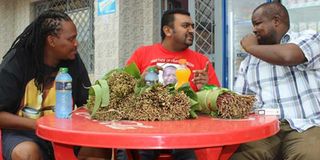Learning in Meru schools affected by UK ban on miraa, study shows

Mr Robert Gichunge (right) chews miraa with his friends at Makutano in Meru. The Crop Diversification study commissioned by Act Change Transformation (ACT) in which Mr Gichunge was the lead consultant says the UK ban on miraa has negatively affected education in Nyambene, Meru County PHOTO | KENNEDY KIMANTHI | NATION MEDIA GROUP
What you need to know:
- Parents, most of who depend on miraa farming to support their livelihoods, have little money after the ban was imposed.
- Kenya used to export about 20 tonnes of miraa weekly valued at Sh1.4 million.
- Increased insecurity in the region is also emerging as a new threat due to the miraa export ban.
- Interviews with the region’s administration revealed that there is a sharp increase in crime recorded since June last year.
The ban on miraa by the United Kingdom has negatively impacted on education in Nyambene in Meru County, says a new study.
The crop diversification study commissioned by Act Change Transformation (ACT) which is supported by the British High Commission says that parents are precariously balancing between the retention of learners in school and roping in others while ensuring they get quality education.
The study says students and pupils are staying away from school due to lack of fees.
Although it does not directly link the trend to the ban on miraa exports, it says that parents, most of who depend on miraa farming to support their livelihoods, have little money after the ban was imposed.
Until last year, the UK was the biggest export market for miraa.
Kenya used to export about 20 tonnes of miraa weekly valued at Sh1.4 million.
TRANSFERS FROM PRIVATE SCHOOLS
The report says that cases of the learners transferring from private schools to public schools where education is cheaper have increased.
It adds that illiteracy levels in Nyambene stand at above 40 per cent, the highest in the county.
“The trends for 2015 indicate decreasing promptness in fees payment compared to same periods for other years.
“Increasing incidents of students staying away from school for longer periods after being sent away to collect fees have also been noted,” said the project’s lead consultant, Mr Robert Gichunge.
Although few cases have been reported according to the research, the enrolment, retention and transition of boys in schools in the region remains higher than that of the boys.
This means that boys of tender ages continue taking up casual labour in miraa farms at the expense of their education.
Increased insecurity in the region is also emerging as a new threat due to the miraa export ban.
INCREASE IN CRIME
Interviews with the region’s administration revealed that there is a sharp increase in crime recorded since June last year.
“In Maua Town, increased muggings have been attributed to youths who have lost jobs in the miraa value chain.
“Crimes noted include murder, petty theft, domestic violence, cattle rustling and organised gangs.
"In Mutuati division, organised crime targeting women in savings and lending programmes has resulted to two deaths,” it reads.
During a forum to validate the report in Meru last week, it was also noted that farmers’ woes are far from over after experts identified the emergence of a new and lethal pest that has been wreaking havoc on the crop.
Mr David Mbaabu, an agricultural officer in Igembe South said farmers especially in the lower parts of Nyambene are on high alert after the outbreak of the brown scale pest.
“The pest has devastated crops in Murera, Kanuni and Kianda areas.
“It sucks the sap out of the crop leaving it to dry,” Mr Mbaabu said.





